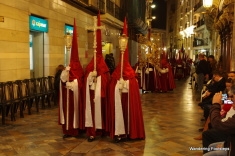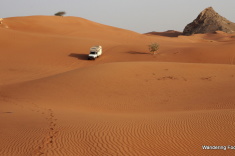Don’t you get bored on the road?
In This Overlanding Life, I’ve answered a series of typical questions we get from people about our life as long-term travelers. I answered questions on all things financial and health and safety; on overland transportation, the pros and cons of traveling in a camper van, and Totoyaya, our very own home-on-wheels.
Those questions I get. This last one, I don’t.
For some reason, a lot of people – those who know us from home or from before our travels, holidayers we meet on the road, locals we chat with about our lifestyle – ask us whether we get bored on the road. They almost expect that we would. Maybe they think they would. I don’t know.
What we say to people who ask us this question is this: thank goodness we don’t work because we don’t know where we’d find the time.
.jpg)
We’re not always sitting on a beach reading books. That WOULD get boring.
And it’s the truth. Our lives are as full and busy as they would be if we lived in one place and held regular, full-time jobs. Maybe even busier. And while sometimes things aren’t exciting (read: downright mundane), that’s not the same thing as being boring.
But it’s also the short answer. In order to share the long answer to the do-you-get-bored question, I’m going to have to do something that’s really hard to do: describe a day in our life. Though practically no two days in our lifestyle are the same, if I try hard enough I can sort our typical days into three categories: tourism days, driving days, and homemaker days. A typical day in our life can be any one, or a mix, of these three days.
Tourism Days
These types of days are the most obvious days and therefore the easiest to understand. We are, after all, on a trip around-the-world. That makes us tourists. It’s kind of like a full-time job of ours. We definitely put forty-plus hours a week into it. Maybe that can help people better understand why we don’t have time to get bored. We still work jobs – it’s just that ours don’t pay.
Tourism days are our most frequent type of day, at probably around 50%. They are also the hardest type of day to describe in a neat little paragraph. They are the primary subject of this blog. For the best understanding of what we do on tourism days, browse the archives at the bottom left corner of this page.
What I can say is that our tourism isn’t quite the same as what many people might think of as tourism. I mean, we very rarely actually join tours. We don’t hit up all the tourist sites in a town; we don’t see every must-see spot in a country. We don’t spend most of our days in museums. Our tourism is more often of the independent, free, wandering variety. We walk to nearby villages. We do our grocery shopping in local markets. We go on road trips (more on that in the next section).
.jpg)
Our tourism rarely looks like this.
.jpg)
It tends to look more like this.
Bruno and I have a certain set of interests that direct our tourism itinerary. For Bruno, it’s definitely animals and wide-open spaces. That leads us to visit a lot of national parks and wilderness areas. My fascination with food, culture, and history leads us to local markets and restaurants, quirky towns, and historical sites. We both love walking, so we hike a lot. We love warmth, so we chase the sun. We’re both curious about whatever place we end up in for the evening, so we go on a lot of afternoon strolls. Our interests guide our tourism more frequently than the guide book.
A lot of our tourism also happens automatically. It happens when we’re driving from one place to the next, getting groceries, doing exercise, repairing the vehicle, or strolling near the campsite. Heck, it even happens at our campsites, like when elephants or monkeys come to steal our food or when we enjoy an evening meal with a view. I guess you could say that our tourism is a seamless part of our daily life, so well-integrated that we rarely even feel like tourists.

Tourism in the mechanic shop.

Tourism during exercise.

Tourism during breakfast.
Driving Days
Driving days, or transit days, are days when we travel with our home-on-wheels to a new location. There is no consistent number of driving days per week – if we’re in a rush to get somewhere (visa issues, weather, an upcoming date) we might drive 4 days a week, but if we’re really enjoying a certain place we might not drive even once for two weeks! If I had to estimate a percentage of our days that are dedicated to driving, it might be around 20%.
On driving days, we generally only drive a couple hundred kilometers, or about 5-6 hours. I know, I know, that’s an incredibly slow speed. Well, sometimes roads are bad. But even when they’re not, we like to take our time. We’re tourists, after all! There’s so much worthy stuff to see on the road between point A and B, and we have the freedom to stop whenever we want to see it (a definite advantage over public transportation). Sometimes we photograph a nice view, visit a road-side stall, study a weird plant, or wander around a village. We always stop for a leisurely lunch, most times a picnic, occasionally a restaurant. From time to time there’s a nap thrown in there, or a little digestion-promenade. Because our journey is as important as are our destinations, driving days are for the most part slow and pleasant. (Though there have been a few epic road trips, and most of them have been harrowing, long, and uncomfortable.)
Driving days start and end with the packing and unpacking of our vehicle. We’ve designed things to make this process as painless and quick as possible. Packing up our vehicle involves taking down our toiletry kits and clothes, putting them on the bed (so they don’t fall when we’re driving), then laying down our camping table and chairs on the floor. We roll up any electric or clothing lines we’ve used, put away our awning if it’s out, and put away our cooking gas and bucket. We check that our water barrel is closed, clothes storage boxes are harnessed in, and windows are closed. The process takes about ten minutes. It’s completed in reverse when we unpack at a new campsite.
Driving days actually start no earlier than tourism or homemaker days. Every morning starts the same: with an early wakeup call (dawn is our alarm clock) and a healthy, leisurely breakfast of fruit, muesli, yogurt, coffee, and freshly-squeezed orange juice. We take the time to eat slowly because we don’t want 20% of our days to start stressfully or rushed. It usually takes us about 75 minutes between the time we wake up and the time we start the engine to hit the road.

Let’s hit the road, yo!

Taking a break on a driving day to check out these really cool birds’ nests in Namibia.

Stopping to photograph a weird plant, before driving to our final destination for the day.

Our breakfast spread. It’s no quickie, not even on driving days.
Homemaker Days
Homemaker days are the most normal of all our days, and the days that aren’t specifically tied to our particular lifestyle. Ideally, they consist of about 30% of our days, because if I don’t get about 2 days a week devoted to homemaking, I begin to feel a bit anxious and tired.
People we meet on the road sometimes ask if we get tired of traveling all the time. I understand where this question comes from – when you’re on a trip, you’re usually doing intensive tourism, and it can become very tiring after a while. Because this is a lifestyle rather than a trip for us, though, we slow down our tourism (between 3-4 tourism days a week) and intersperse them with these homemaker days.
What exactly are homemaker days for us? Well, they’re pretty humdrum, really. They involve cleaning, blogging, and laundry. They involve replying to emails and dealing with banking and getting groceries. They involve researching upcoming campsites and places to see, and, for me, updating this blog. For Bruno, they involve dealing with any necessary maintenance on Totoyaya.
During these days, we not only take care of business – we re-energize and rebalance ourselves. It’s partly because of these ordinary days that our tourism days continue to feel special. You have to experience the mundane to feel the exciting. You have to have ordinary moments to have stop-you-in-your-track moments.

Doing some emailing and blogging while the laundry dries.

Taking care of car business.

Hey, I work too!

Yep, that’s me working again.
This blog might focus more on the tourist 50% of our life – and especially those stop-you-in-your-tracks moments – but there are other sides to our life besides the beautiful pictures and the awe-inspiring experiences. We have a morning routine just like most of you. We watch TV programs and read books at night, just like you. And we’re busy, just like you. We’re so busy that, in case you didn’t notice, we don’t have a lot of time scheduled in for relaxation, let alone boredom.
So, in order to answer the question: No, we don’t get bored. We’re too busy to be bored!



Dave Braun - I have never taken trips like you, but I have taken a few long trips (8 weeks to visit Guatemala) or 8 (weeks in Peru), etc. I can really identify with your life style. I have always felt pressed for time and would have liked not having a schedule or a fixed date to be somewhere. I wonder how long it would take for me to get bored of meeting new people? I know it would take a long long time.
Brittany - Hi Dave, I just replied to your very interesting email but wanted to say “hi” here too. I always find it incredible when people ask us if we get bored – between the people we meet, the beautiful landscapes we pass, the history we learn, the cultural elements we are exposed to, the food we sample, and the activities we try, there’s definitely no time for boredom! Glad to hear you’d have trouble being bored, too – this is probably an essential personality trait for someone considering the overlanding lifestyle!
Elizabeth - With the lifestyle you are leading, the question of boredom surprises me. I can’t imagine you being bored in your travels and you illustrated well why you and Bruno are not!
Brittany - It surprises me as well, but I suppose I can understand that, for many, after a few weeks of tourism, they might like to return to their regular life or work? Well, certainly not us!! 🙂